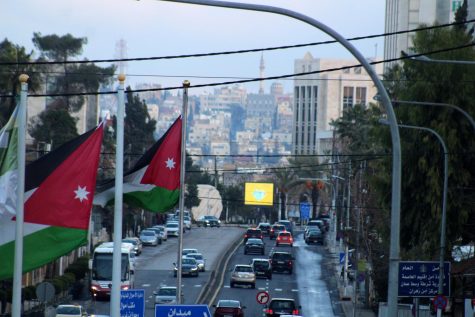An Allegheny Gator in King Abdullah’s court
Amman, Jordan. Where to start?
Upon arriving in Jordan, I found myself struck by a new paradigm — “big world” — in which I was inconceivably small, in which a single person is no more responsible for solving the world’s problems as a single water droplet is for putting out a forest fire. It’s liberating and it’s terrifying.
In my new “big world,” humanity is a vast cosmic force that defies individual attempts to influence it or change it. It’s the exact opposite of the paradigm I’m used to in academic discourse — “problem-solution” — in which we identify problems and try to direct our knowledge toward solving them.
For the value a problem-solution paradigm brings to efforts to improve and perfect the world, it does rely on a pretty big caveat: it reduces complex actors and elements of the problem to their most fundamental attributes to understand how they can be used in a potential solution. It shrinks the world. All cities are grouped together, with humanity lumped into similar bubbles for ease of comprehension. I left the United States thinking that, while living in Amman would be a new and exciting experience, it would be structurally the same as the dozen other cities I’ve visited across the world.

I could not have been more wrong. Yes, Amman is a lot like San Francisco, Chicago or Islamabad. But in the details, Amman is unique. It breathes ever-so-differently than any other metropolis, even if it feels at times familiar. Narrow, one-way lanes are linked by massive four- or six-lane main roads that would make any American interstate jealous. Small businesses fill the streets, “supermarkets” provide most of what I need from a cramped room jammed with bread and shampoo and freezers. I see only glimpses of other cities — the narrow side streets that resemble Amsterdam vanish in a heartbeat with the same call to prayer heard in Islamabad.
Thanks to five semesters of Arabic, surviving on the street is not as difficult as I thought it would be. Quick phrases and sentences are enough to get by, and someone even asked if I was Jordanian myself. At that moment, I felt seen as something approaching “normal.” Growing up as an American with an Arab given name and a Persian last name, I got used to confused looks and being pigeonholed into the “multicultural” demographic. Even in Jordan, my rough Arabic and general ineptitude quickly marked me as an interloping American, well-meaning but clumsy. But in those briefest of moments before I admitted to my nationality, I realized that many probably see me as just another Jordanian, and not the bastard child of three empires adrift in a globalized world.
The food, while different, is familiar and relatively recognizable from mosque events and cultural gatherings. Falafel and shawarma are now found not just in the Middle East, but at Arab restaurants across the country and Muslim enclaves the world over.
There are wonderful cityscapes and skylines in every direction, with mosques and brand-new skyscrapers intermixed with elderly apartment buildings and the liberal use of car horns. Appreciating this uniqueness — the way the city is built on hills, the way that drivers ignore every road safety law and yet are totally aware of their surroundings, the way I inch down an ancient staircase to reach my modern bus trip to class — makes me realize just how vast this world is.
Saying there are 10,000 cities on Earth feels like just another statistic. But if I named every one of those cities the list would fill five of this newspaper’s pages. In the “big world” paradigm I find myself in, society is not a set of problems to solve or crises to avert, but a cosmic force that moves whether we want it to or not.
I’ll float back down to problem-solution soon enough — academic and mundanity of day-to-day life demand it. I hope, however, that every time I crest a hill and see Amman laid out in front of me, I can feel insignificant again, and that even long after I bid Jordan farewell I can feel awe and wonder at the vastness of humanity.

Sami Mirza is a senior from many different places. He is majoring in International Studies with a focus on the Middle East and North Africa and minor in...







